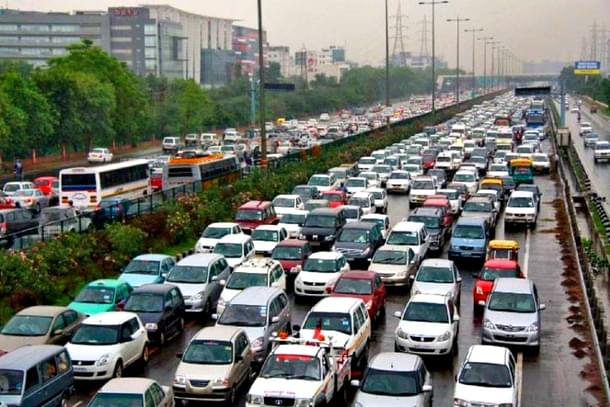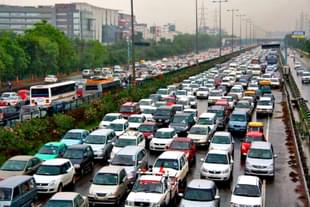Infrastructure
Bengaluru's Future Mobility: Namma Metro Chief Proposes Singapore Model For Tackling Traffic Congestion
V Bhagya Subhashini
Dec 01, 2023, 11:21 AM | Updated 11:29 AM IST
Save & read from anywhere!
Bookmark stories for easy access on any device or the Swarajya app.


Anjum Parvez, the managing director of Bangalore Metro Rail Corporation Ltd. (BMRCL), has recommended that Bengaluru should adopt the Singapore model to address traffic congestion and alleviate vehicular gridlock in its central business district areas.
He suggested this in a session on 'Future mobility' at the Bengaluru Tech Summit-2023 on Thursday (30 November).
Singapore model is characterised by a more punitive approach to Bengaluru's traffic problem. Citing the escalating number of cars in Bengaluru without corresponding control measures, Parvez proposed a system akin to Singapore's, where individuals would require permission to own a car, and the permit itself would surpass the car's value in cost.
Despite this seemingly strict stance, Parvez emphasised the importance of simultaneously providing high-quality public transport, stating, "We can't just punish."
Bengaluru — The Traffic Capital
The critical issue of traffic congestion has plagued Bengaluru for years. According to the TomTom Traffic Index, Bengaluru holds the dubious distinction of being one of the world's most congested cities, second only to London.
In 2022, it took an additional 29 minutes and 10 seconds to cover a mere 10-kilometre distance, as per the TomTom Traffic Index.
Bengaluru has witnessed rapid urbanisation and economic growth, leading to an explosion in the number of vehicles on its roads.
The city's infrastructure has struggled to keep pace with this growth, resulting in daily traffic snarls, long commutes, and increased pollution levels.
Bengaluru's vehicular population has surpassed one crore, with around 1,300 new bikes and 400 new cars hitting the streets daily.
Parvez also advocated for implementing congestion charges in the central business district to alleviate traffic congestion, suggesting that Bengaluru should adopt the Singapore model for the next 5-10 years.
Highlighting the role of Metro rail as a lifestyle choice, Parvez acknowledged its limitations in solving the city's traffic woes, reports Times Of India.
Currently, the Bengaluru Metropolitan Transport Corporation (BMTC) holds a monopoly on bus services and transportation. Despite the willingness of many tech firms to purchase buses for services between their offices/campuses and the nearest metro stations, the existing Motor Vehicle Act prohibits such arrangements, necessitating amendments, explained Parvez.
He elaborated, "Several private tech firms are prepared to procure buses if granted tailored permissions to operate between the gates of 10 different IT firms and metro stations, serving as a feeder service for tech professionals using the metro."
To facilitate this, amendments to the Motor Vehicle Act and permissions from BMTC for IT companies are required, and discussions with the Transport Department are underway, he added.
National Common Mobility Card (NCMC) Implementation
Parvez also highlighted the upcoming implementation of a National Common Mobility Card (NCMC), an inter-operable transport card, allowing seamless travel across various public mobility options using a single card.
To streamline the card adoption process, the BMRCL has opened counters at all 73 stations without KYC verification.
Focusing On First And Last-Mile Mobility
Emphasising the importance of first and last-mile mobility, Parvez reiterated BMRCL's commitment to providing metro stations within a 2-km radius for every Bengalurean.
Addressing bottlenecks in these critical mobility segments, he called for collaborative efforts among stakeholders.
Parvez also emphasised the BMRCL's dedication to eco-friendly initiatives. Metro stations are now equipped with electric vehicle charging units for two-wheelers and three-wheelers to encourage sustainable traffic systems.
Uber India director Sanjay Chadha, advocated for a shift from cabs to public transport, particularly buses, to ease traffic congestion. He mentioned Uber's introduction of an electric bus service in Mumbai and Delhi, with plans to expand similar services in Bengaluru.
Prasanna Patwardhan of Prasanna Purple Mobility Solutions, recommended prioritising investments in moving people over vehicles, and advocating for the development of footpaths, cycle tracks, and infrastructure for shared mobility.
V Bhagya Subhashini is a staff writer at Swarajya. She tracks infrastructure developments.




